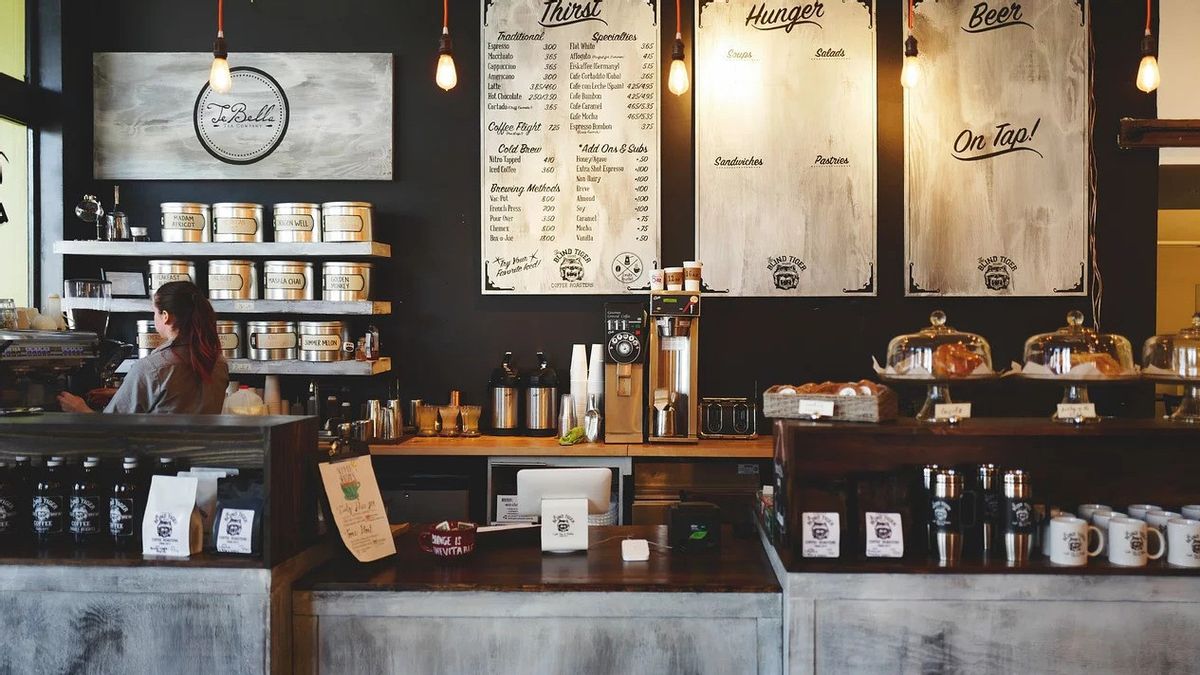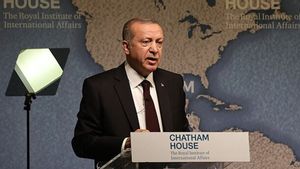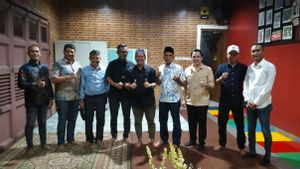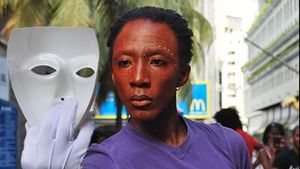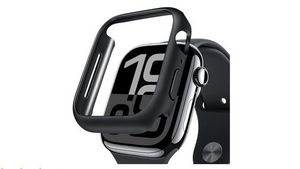JAKARTA - The coffee shop business in Indonesia continues to grow, becoming an emerging business that appears like a fungus in the rainy season. This can be seen from the significant increase in the number of coffee shops in Indonesia in the last three years and the increase in domestic coffee consumption in Indonesia.
The research results of TOFFIN, a company providing business solutions in the form of goods and services in the HOREKA industry (hotels, restaurants and cafes), in Indonesia, show that the number of coffee shops in Indonesia in August 2019 reached more than 2,950 outlets, an increase of almost three times compared to 2016. which is only about 1,000.
The real number of coffee shops could be greater because the coffee shop census only includes networked outlets in big cities, not including modern and traditional independent coffee shops in various regions.
Meanwhile, Indonesia's domestic coffee consumption also continues to increase. The 2019 Indonesian Coffee Consumption Annual Data released by the Global Agricultural Information Network shows the projection of domestic consumption ( Coffee Domestic Consumption ) in 2019/2020 to reach 294,000 tons or an increase of around 13.9 percent compared to consumption in 2018/2019 which reached 258,000 tons.
On a per capita basis, Indonesian people's coffee consumption is still relatively low compared to other countries, which is only around 1 kilogram in 2018. Compared with Vietnam, whose income level is below Indonesia, per capita coffee consumption reached 1.5 kilograms in the same year.
From a business perspective , sales of Ready to Drink (RTD) Coffee products or ready-to-drink coffee — such as coffee products sold in coffee shops — continue to increase. According to Euromonitor's data, in 2013 the retail sales volume of RTD Coffee Indonesia was only around 50 million liters, in 2018 it was almost 120 million liters.
"This research is needed because so far there has been no survey or research on the coffee shop industry in Indonesia. For this reason, it is hoped that this research will become a guide for coffee shop business players in Indonesia," said Nicky Kusuma, Vice President Sales and Marketing for TOFFIN Indonesia, in a statement. received by VOI , Tuesday 17 December.
Research on the development of the coffee shop business in Indonesia conducted by TOFFIN through in- depth interviews with stakeholders in the Indonesian coffee shop industry shows that there are seven factors that drive the growth of the coffee shop business in Indonesia, namely:
1. The habit (culture) of hanging out while drinking coffee.
2. Increased consumer purchasing power, growing middle class, and the price of RTD Coffee in more affordable modern shops.
3. The dominance of the population of young Indonesians (Generation Y and Z) who create a new lifestyle in consuming coffee.
4. The presence of social media that makes it easy for coffee shop businessmen to carry out marketing and promotional activities.
5. The presence of ride hailing platforms (Grabfood and Gofood) which simplifies the sales process.
6. The low number of entries barriers in the coffee business which is supported by the availability of raw materials, equipment (coffee machines) and resources to build a coffee shop business.
7. The margin of the coffee shop business is relatively high.
Seeing the development of these driving factors, the coffee shop business in Indonesia is predicted to remain positive next year. Andreas Chang, CEO of Tahta Coffee, even believes that the coffee shop market is still strong because his five-year study shows that the consumption of RTD Coffee has tripled.
"This is still a very far gap . So this business is still emerging ," said Andreas Chang.
Meanwhile, Edison Manalu, CEO of Harvest Group, estimates that the growth will still be double digits . With the current recorded number of outlets and the assumption of an average sales per outlet of 200 cups per day, as well as a coffee price per cup of IDR 22,500, TOFFIN estimates that the market value of coffee shops in Indonesia will reach IDR 4.8 trillion per year.
The growth projection in 2020 is also based on insights from consumers gathered through online surveys of young coffee fans (generations Y and Z) in Indonesia.
The survey results, among others, show that Coffee to Go shops that provide quality RTD Coffee at affordable prices are in great demand by the generation that dominates Indonesia's population today.
In the past year, 40 percent of this generation purchased their coffee from this type of coffee shop. With an average share of wallet allocation of IDR 200,000 per month, the coffee shop business of this type is expected to grow significantly in the coming years.

Four Waves of the Coffee Industry
Coffee shop business players in Indonesia divide the industry's journey into four major waves. TOFFIN tries to identify the four waves based on the momentum of the entry of phenomenal coffee shop brands into this industry in Indonesia.
Wave I (1980-1990s decade). At this time, most Indonesians enjoyed instant coffee (in sachets) provided by consumer product manufacturers (ABC coffee, Kapal Api, Torabika, Nescafe) and unbranded brewed coffee. At this time RTD Coffee products were mostly provided by traditional coffee shops and by a few modern coffee shops, namely Dunkin (1985), Olala (1990), and Excelso (1991).
Wave II (Decade 2000). At this time the trend of drinking coffee in modern coffee shops has begun to change from a trend of fulfilling functional needs (drinking coffee to refresh) to fulfilling emotional needs, where enjoying a glass of coffee in modern outlets is perceived as increasing prestige. This period was marked by the entry of the modern coffee shop chain brands from the United States Starbucks (2002) and Coffee Bean (2001).
Batch III (Early 2010 to 2015). During this period, consumer appreciation for coffee increased, marked by the presence of artisan coffee shops such as Tanamera in 2013. At this time consumers not only enjoyed the prestige of drinking coffee in cafes, but began to be interested in the process of producing a cup of coffee. At this time, the presence of coffee machines became a visual reference for consumers. At this time, business people became increasingly aware of the sexiness of the coffee shop business in Indonesia. Many brands are just starting to enter the market.
Wave IV (2016 to present). During this period the size of the coffee shop market in Indonesia increased significantly. New brands of coffee shops have sprung up and each of them immediately expands to open tens to hundreds of branches in various cities. To work on the young segment (school children to first jobbers ), these coffee shop businessmen have opened a Coffee to Go shop, a small shop that provides fresh RTD Coffee at affordable prices to take home or not to consume on the spot ( take away ). The presence of the Gofood and Grabfood ride hailing platforms has also contributed to the booming of this Coffee to Go shop.
One coffee shop entrepreneur, Annisa Nurfitriyani admitted that she was moved to open a coffee shop because she saw the huge market potential. He agrees with TOFFIN's explanation that the habit of young people who like to hang out is a factor in the number of coffee shops in Indonesia today.
"The trend now that Y and Z generations prefer to hang out in coffee shops . In the past, young people preferred the mall, but now I think that young people are a bit lazy to hang out at the mall. They (young people) looking for a more intimate place, in a coffee shop , "he told VOI .
According to him, the social media factor is also the reason for him to run a coffee shop business. He considered social media to make it easier in terms of promotion through its features.

The owner of a coffee shop named Koffie Mabelas added that he also wanted to help drive the country's economy by helping to increase the absorption of domestic coffee products by providing local types of coffee.
"I provide several local coffees such as Aceh Gayo, Lintong North Sumatra, Bali Kintamani, Papua Wamena, and Toraja Sapan," he explained.
The Indonesian Coffee Exporters Association (AEKI) stated that the contribution of the coffee shop business this year is estimated to be around 25 percent of the total domestic absorption which is predicted to reach 360,000-380,000 tons. This figure is higher when compared to 2018 where the coffee shop business only contributed around 18 to 20 percent of local production coffee absorption.
AEKI stated that in recent years domestic coffee absorption has increased quite significantly. Moreover, in recent years the coffee shop business has continued to grow in Indonesia.
The English, Chinese, Japanese, Arabic, and French versions are automatically generated by the AI. So there may still be inaccuracies in translating, please always see Indonesian as our main language. (system supported by DigitalSiber.id)
